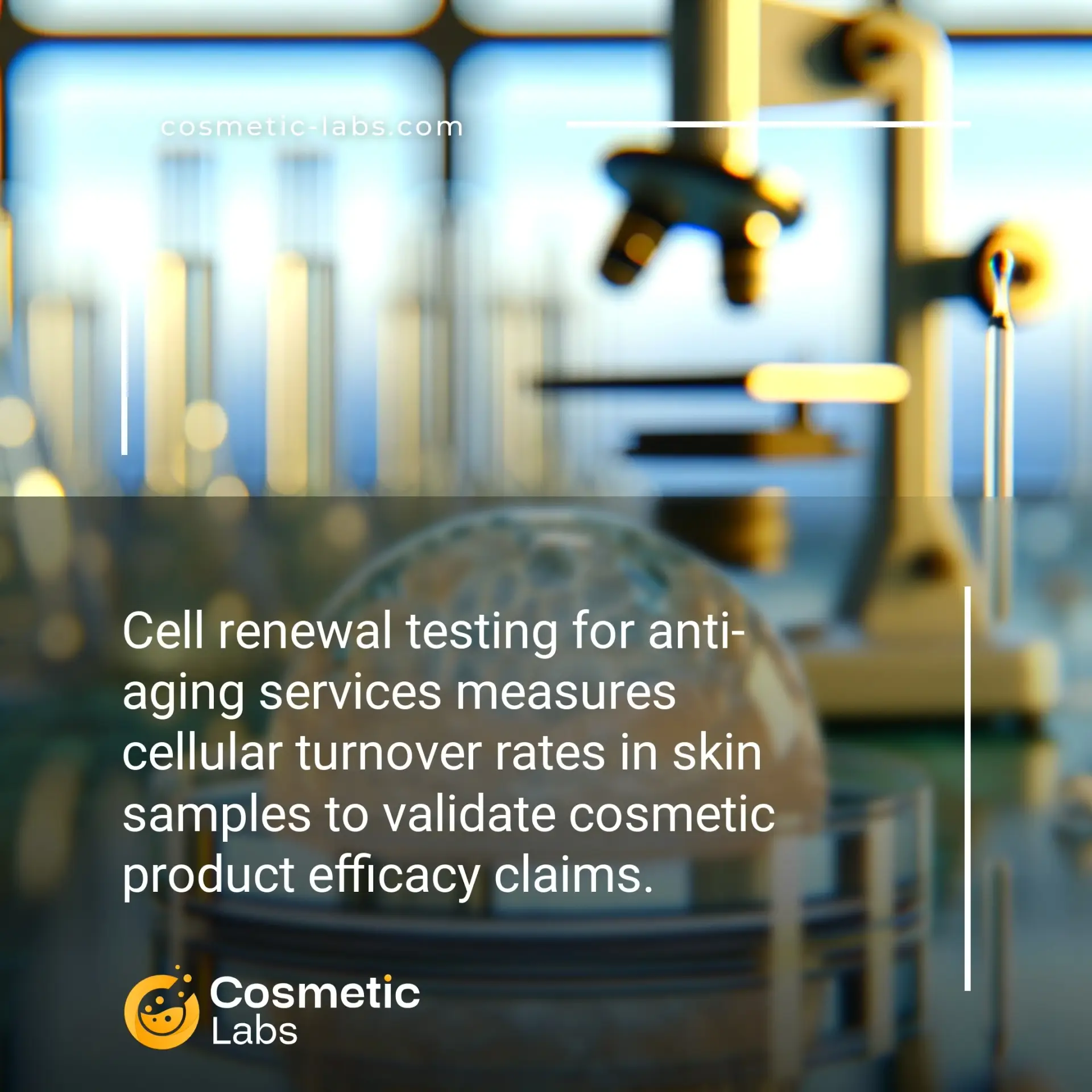Cell Renewal Testing Services for Anti-Aging Products

What is Cell renewal testing?
Cell renewal testing for anti-aging services is a laboratory assessment that measures how cosmetic ingredients and formulations stimulate cellular turnover and regeneration in skin tissue. Our partner labs use in vitro keratinocyte proliferation assays and fibroblast activity measurements to evaluate your product’s ability to accelerate natural skin renewal processes. This testing provides quantifiable data on collagen synthesis rates and epidermal cell division, giving you the scientific backing needed for anti-aging product claims.
Why do you need this service?
Cosmetic labs use cellular turnover assays to validate anti-aging claims for serums and creams targeting mature skin concerns. These tests measure keratinocyte proliferation rates and epidermal thickness changes, providing brands with quantifiable data for regulatory submissions and marketing claims. Labs also apply mitotic activity analysis to compare formulations containing retinoids, peptides, or growth factors against control groups.
Who provides Cell renewal testing services?
All cosmetic labs providing Cell renewal testing services
There is no company providing these services at the moment.
Cell Renewal Testing for Anti-Aging Products
Cell renewal testing measures how effectively anti-aging formulations stimulate cellular turnover and regeneration processes. Labs on our platform use advanced in vitro and ex vivo methods to evaluate your product’s ability to accelerate skin cell renewal, providing the scientific validation needed for anti-aging claims.
Cellular Proliferation Assays
Labs run specific assays to measure how your ingredients boost keratinocyte and fibroblast proliferation rates. These tests track cell division cycles over 24-72 hour periods using fluorescent markers and automated imaging systems.
Key measurements include:
- Cell viability percentages at different concentrations
- Mitotic index calculations
- DNA synthesis rates through BrdU incorporation
- Growth factor expression levels
Results help you determine optimal active concentrations and support claims about accelerated skin renewal.
Epidermal Turnover Analysis
Partner labs evaluate how formulations affect the complete skin renewal cycle using reconstructed epidermis models. These tests measure the time required for cells to migrate from basal layer to surface shedding.
Testing protocols examine:
- Stratum corneum thickness changes
- Desquamation enzyme activity
- Barrier function recovery rates
- Differentiation marker expression
This data validates claims about improved skin texture and reduced appearance of fine lines. Connect with experienced labs through our platform to design cell renewal studies that meet your specific product development needs.
Practical Applications of Cell Renewal Testing for Anti-Aging Services
Beauty brands use cell renewal testing for anti-aging services to validate product claims and optimize formulations before market launch.
Product Development and Formulation Optimization
Cosmetic labs conduct cellular turnover assays to measure how ingredients affect keratinocyte proliferation and differentiation. Teams test active compounds like retinoids, peptides, and botanical extracts using human skin cell cultures to determine optimal concentrations. These protocols typically run 7-14 days and measure cell cycle progression through flow cytometry analysis.
Labs also evaluate epidermal renewal rates using bromodeoxyuridine incorporation studies. This approach helps brands identify which formulations accelerate natural skin renewal processes without causing irritation or excessive cell turnover.
Claims Substantiation and Regulatory Support
Brands submit cell renewal data to support marketing claims about skin renewal and anti-aging benefits. Testing protocols measure mitotic activity, DNA synthesis rates, and cellular regeneration markers like Ki-67 expression. Labs provide detailed reports showing statistical significance and dose-response relationships.
International markets require specific documentation for anti-aging claims. Cell renewal studies offer quantifiable evidence that regulatory bodies accept, particularly when combined with clinical efficacy data and consumer perception studies.
| Testing Method | Measurement | Timeline | Primary Application |
|---|---|---|---|
| MTT Proliferation Assay | Cell viability and growth | 3-5 days | Ingredient screening |
| BrdU Incorporation | DNA synthesis rate | 7-10 days | Renewal rate analysis |
| Flow Cytometry | Cell cycle distribution | 5-7 days | Mechanism studies |
| Ki-67 Immunostaining | Proliferation markers | 10-14 days | Claims validation |
Ready to validate your anti-aging formulations? Contact specialized cosmetic labs on our platform to discuss cell renewal testing protocols that match your product development timeline and regulatory requirements.
